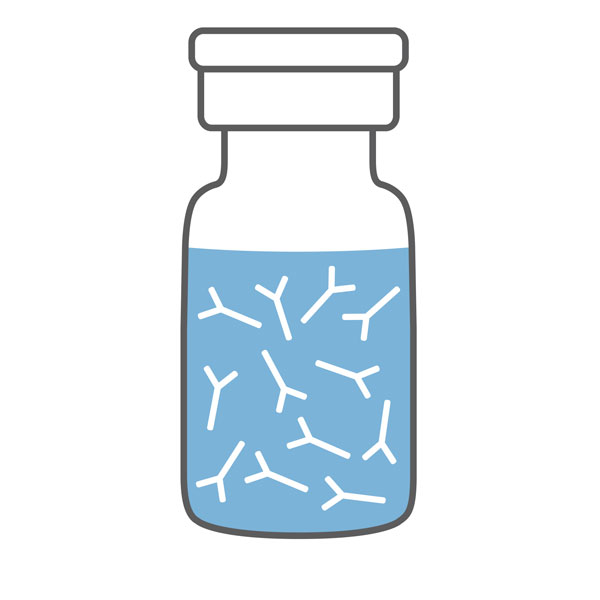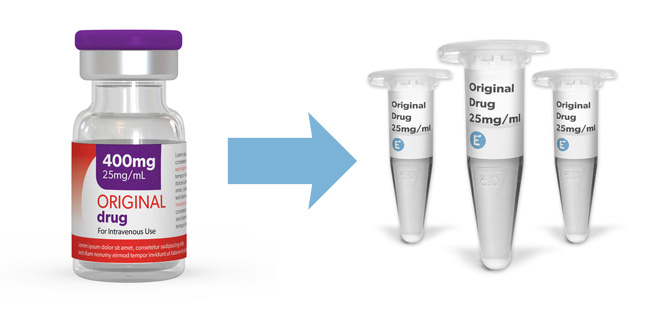| Drug name | Remicade®
|
| INN | Infliximab |
| API type | Infliximab is a chimeric human-murine IgG1 monoclonal antibody produced in murine hybridoma cells by recombinant DNA technology. After reconstitution each ml contains 10 mg of infliximab.
|
Pharmacotherapeutic group
| tumour necrosis factor alpha (TNFα) inhibitors
|
ATC code
| L04AB02 |
Target of antibody
| TNF-α; Synonyms: DIF, TNF-alpha, TNFA, TNFSF2, RATTNF, Tnfa, tnf, TNF-a, TNFalpha, Tnfsf1a, TNFa, cTNF, Tnf-alpha, tnfa-like, TNF-ALPHA, dif, tnfa, xtnf, tnfsf2, tnf-alpha, Cachectin
|
| General function | Infliximab is indicate for rheumatoid arthritis, Adult and paediatric Crohn's disease, ulcerative colitis, ankylosing spondylitis and psoriasis. |
| Short description | |
Pharmacodynamic properties
(Mechanism of action; Source EMA document)
| Infliximab is a chimeric human-murine monoclonal antibody that binds with high affinity to both soluble and transmembrane forms of TNFα but not to lymphotoxin α (TNFß).
|
| Pharmacodynamic properties (Pharmacodynamic effects; Source EMA document) | Infliximab inhibits the functional activity of TNFα in a wide variety of in vitro bioassays. Infliximab prevented disease in transgenic mice that develop polyarthritis as a result of constitutive expression of human TNFα and when administered after disease onset, it allowed eroded joints to heal. In vivo, infliximab rapidly forms stable complexes with human TNFα, a process that parallels the loss of TNFα bioactivity.
Elevated concentrations of TNFα have been found in the joints of rheumatoid arthritis patients and correlate with elevated disease activity. In rheumatoid arthritis, treatment with infliximab reduced infiltration of inflammatory cells into inflamed areas of the joint as well as expression of molecules mediating cellular adhesion, chemoattraction and tissue degradation. After infliximab treatment, patients exhibited decreased levels of serum interleukin 6 (IL-6) and C-reactive protein (CRP), and increased haemoglobin levels in rheumatoid arthritis patients with reduced haemoglobin levels, compared with baseline. Peripheral blood lymphocytes further showed no significant decrease in number or in proliferative responses to in vitro mitogenic stimulation when compared with untreated patients’ cells. In psoriasis patients, treatment with infliximab resulted in decreases in epidermal inflammation and normalization of keratinocyte differentiation in psoriatic plaques. In psoriatic arthritis, short term treatment with Remicade reduced the number of T-cells and blood vessels in the synovium and psoriatic skin.
Histological evaluation of colonic biopsies, obtained before and 4 weeks after administration of infliximab, revealed a substantial reduction in detectable TNFα. Infliximab treatment of Crohn’s disease patients was also associated with a substantial reduction of the commonly elevated serum inflammatory marker, CRP. Total peripheral white blood cell counts were minimally affected in infliximab-treated patients, although changes in lymphocytes, monocytes and neutrophils reflected shifts towards normal ranges. Peripheral blood mononuclear cells (PBMC) from infliximab-treated patients showed undiminished proliferative responsiveness to stimuli compared with untreated patients, and no substantial changes in cytokine production by stimulated PBMC were observed following treatment with infliximab. Analysis of lamina propria mononuclear cells obtained by biopsy of the intestinal mucosa showed that infliximab treatment caused a reduction in the number of cells capable of expressing TNFα and interferonγ. Additional histological studies provided evidence that treatment with infliximab reduces the infiltration of inflammatory cells into affected areas of the intestine and the presence of inflammation markers at these sites. Endoscopic studies of intestinal mucosa have shown evidence of mucosal healing in infliximab-treated patients.
|
Original license holder
| |
Marketing authorisation numbers
| EU/1/99/116/001 - 005
|
Marketing authorisation holder
| Janssen Biologics B.V.
Einsteinweg 101
2333 CB Leiden
The Netherlands
|
Name of the manufacturer of the biological active substance
| Janssen Biologics B.V.
Einsteinweg 101
2333 CB Leiden
The Netherlands
Janssen Biotech Inc.
200 Great Valley Parkway Malvern
Pennsylvania 19355-1307, United States of America
|
| Name and address of the manufacturer(s) responsible for batch release | Janssen Biologics B.V.
Einsteinweg 101
2333 CB Leiden
The Netherlands
|
Max shelf life
| 36 months
|
Storage conditions
| 2°C – 8°C
|
List of excipients
| Sucrose
Polysorbate
80
Monobasic sodium phosphate
Dibasic sodium phosphate
|
| |
| |
















